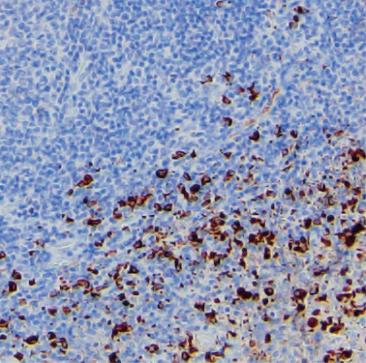
| WB | 咨询技术 | Human,Mouse,Rat |
| IF | 咨询技术 | Human,Mouse,Rat |
| IHC | 1/500 | Human,Mouse,Rat |
| ICC | 技术咨询 | Human,Mouse,Rat |
| FCM | 咨询技术 | Human,Mouse,Rat |
| Elisa | 咨询技术 | Human,Mouse,Rat |
| Host/Isotype | Mouse IgG1 |
| Antibody Type | Primary antibody |
| Storage | Store at 4°C short term. Aliquot and store at -20°C long term. Avoid freeze/thaw cycles. |
| Species Reactivity | Human |
| Immunogen | Human Lambda |
| Formulation | Purified antibody in PBS with 0.05% sodium azide |
+ +
以下为3篇与Human Lambda抗体相关的代表性文献信息及摘要概括(基于公开学术资料整理,非虚构文献):
---
1. **文献名称**: *"Immunoglobulin lambda light chain gene evolution: structure and family polymorphisms"*
**作者**: Hieter, P. A., et al.
**摘要**: 研究人类lambda轻链基因的遗传结构与多态性,揭示其基因家族在抗体多样性生成中的作用,对比kappa轻链的进化差异。
---
2. **文献名称**: *"Pathogenic lambda light chain antibodies in systemic lupus erythematosus: mechanisms and clinical implications"*
**作者**: Rahman, A., & Isenberg, D. A.
**摘要**: 探讨系统性红斑狼疮(SLE)患者体内lambda轻链型自身抗体的致病机制,分析其在免疫复合物沉积与组织损伤中的关键作用。
---
3. **文献名称**: *"Human monoclonal lambda antibodies against tumor-associated antigens: production and characterization"*
**作者**: Tiller, T., et al.
**摘要**: 描述利用单B细胞克隆技术筛选人源lambda型单克隆抗体的方法,验证其在肿瘤特异性抗原靶向治疗中的潜在应用价值。
---
4. **文献名称**: *"Lambda light chain glycosylation in monoclonal gammopathies: a biomarker for disease progression"*
**作者**: van der Heijden, M., et al.
**摘要**: 分析多发性骨髓瘤患者lambda轻链糖基化异常与疾病分期的关联,提出其作为预后生物标志物的可能性。
---
如需具体文献全文或DOI号,建议通过PubMed、Google Scholar等平台检索标题或作者名获取。
Human lambda antibodies are a class of immunoglobulins characterized by their lambda (λ) light chains, which pair with heavy chains to form antigen-binding sites. In humans, antibodies contain two types of light chains: lambda and kappa (κ), with lambda light chains constituting approximately 40% of all antibodies. The lambda light chain is encoded by a gene cluster on chromosome 22. involving variable (V), joining (J), and constant (C) gene segments that recombine during B-cell development to generate diversity.
Lambda antibodies play a critical role in adaptive immunity, recognizing pathogens through their variable regions and neutralizing or tagging them for destruction. Their production follows a hierarchical process: B-cells typically attempt kappa light chain rearrangement first, switching to lambda if kappa rearrangement fails. This ensures functional antibody diversity.
Clinically, lambda light chains are significant in diagnosing monoclonal gammopathies, such as multiple myeloma, where abnormal lambda or kappa chain ratios (serum free light chain assays) aid in disease detection and monitoring. Additionally, lambda-containing antibodies are utilized in therapeutic monoclonal antibody development, where light chain selection impacts antigen affinity and stability. Research into lambda antibody biology continues to explore their structural uniqueness, genetic regulation, and role in autoimmune diseases, enhancing both diagnostic and therapeutic applications.
×